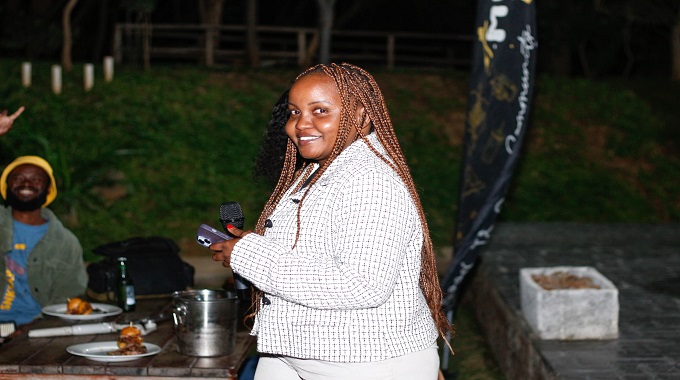From Marondera to Glasgow…Zeke Manyika’s musical odyssey

Mbulelo Mpofu, [email protected]
OUR world is divided by boundaries and prejudices, but there exists a language that transcends all barriers — a universal melody that speaks to the soul and tugs at the heartstrings with an ineffable force. Meet Zeke Manyika, a musical prodigy whose journey from the dusty streets of Marondera in Zimbabwe to the stages of Scotland’s Glasgow and beyond has been nothing short of a sensation.
Born to Kennedy and Rahab Manyika during the tumultuous era of imperialism, Zeke’s upbringing was marked by hardship and turmoil. His father, a teacher and choir master, faced constant clashes with Rhodesian troops, making life unbearable for the family. Yet, within these challenging circumstances, a passion for music took root in young Zeke’s heart.
Amid the flickering glow of a transistor radio, Zeke discovered a world of diverse influences. From the resonating baritone of Jim Reeves to the soul-stirring melodies of African legends like Hugh Masekela and Miriam Makeba, the radio waves ignited his soul with a vibrant blend of sounds.
“Creedence Clearwater Revival were a very influential band on me,” he says.

Fate intervened when an opportunity to escape the oppressive atmosphere of then Rhodesia presented itself. Zeke’s path led him to Glasgow, Scotland, where the vibrant city offered a newfound freedom and limitless opportunities. What began as a pursuit of education soon transformed into an unwavering dedication to his musical calling.
Back home, he would always be one moment away from clashing with security details given his theatrical background that would leave him at the brink of what he called, “being political.”
“What we were doing wasn’t directly political,” he told an interviewer one day, “but you couldn’t help being political in that atmosphere. Every time you told the truth you were being political.”
Against his parents’ wishes, Zeke chose the path of percussion, igniting a bold rebellion that would lead to extraordinary encounters and collaborations. Embracing a fusion of African rhythms with Scottish flair, Zeke’s drumming skills saw him being spotted and nurtured by Edwyn Collins who found the independent band, Orange Juice. His soulful chants and vocals added a unique African dimension to their songs, leaving the Scottish audience awe-struck and captivated and elevating the band to unparalleled heights.
His drumming skills put Orange Juice on a pedestal and one of the most-sought after bands in the early 1980s.
He would later switch gears and up the ante, adding vocals and chants to songs. For the first time, the Scottish audience didn’t know what hit them when Orange Juice would release, Hokoyo and A million pleading faces in the Shona language.
That would herald a different sound for the pop band and soon, Zeke would be to Orange Juice what Bruce Grobbelaar was to English football outfit, Liverpool, playing a pivotal role in how the band would stamp its presence in the music scene, leaving a continental trail.
But fame brought its own challenges. Zeke’s decision to discard his Rhodesian passport for artistic expression restricted him from international travel, posing a dilemma for the band. Undeterred, he proposed training a session drummer to travel with them, sparking tensions within the group. Despite the trials, Zeke remained steadfast in his pursuit of spreading his music and message against colonialism.
“In some ways, I think I should have just really put my foot down and insisted on that happening because it sort of stifled Orange Juice’s career,” he would recollect.
Beyond the spotlight and accolades, Zeke never forgot his roots. His music always carries the essence of his African heritage, a testimony to the eternal connection he holds with his homeland, Zimbabwe. Throughout his journey, he crossed paths with remarkable minds, each leaving an indelible mark on his artistic soul.
“My stuff will always be a bit weird. I’m just as amazed as any British person is by African music. I’ve been here ten years and it now sounds a lot different because I’m looking at it from the outside. But, at the same time, when I start to react to it my African influences come across, from the inside,” said Zeke.
As his fame soared, Zeke’s musical pilgrimage led him to encounter Dali Tambo, son of the late South African leader Oliver Tambo. Through this meeting, Zeke’s special message against colonialism found a resonating platform, and the African National Congress welcomed him to perform in South Africa at the height of apartheid.
The Manyika family’s fight for justice in Rhodesia bore fruit when Zeke’s father, Kennedy was appointed as the Ambassador to Yugoslavia by the new Government. Despite the triumph, a broken heart claimed Kennedy’s life and he was declared a liberation hero.

Zeke’s discography, enriched with songs like Bible Belt, Heaven Help Us, and Sununguka, Maswera, is a testament to his unwavering dedication to the art that has defined his life.
Today, Zeke finds himself settled in the quaint seaside town of Bexhill, England, alongside his wife Gina. Music remains an integral part of his life, a constant companion that echoes the struggles and triumphs of his past.
And while Zimbabweans have always cherished music, Zeke knows that during the Rhodesian era, it played a particularly powerful role as a beacon of hope and resilience.
Report adapted from Rolling Stone
@MbuleloMpofu











Comments